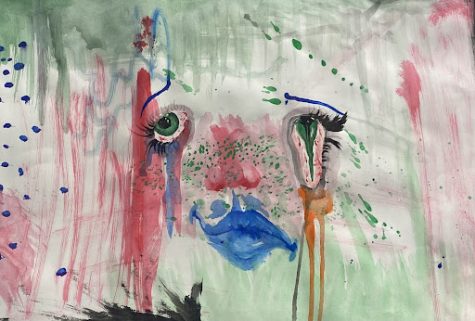Mental Health vs. The Pandemic

April 6, 2022
COVID’s Insidious Effect on Mental Health
COVID-19 is not the only sickness plaguing the planet. As the world has turned its focus to slowing the spread of the coronavirus, the acknowledgment given to other illnesses, including those that affect mental health, has dwindled. Mental health includes emotional, psychological, and social well-being. The state of our mental health affects who we are and how we interact with others, and there are two main factors that influence it: biological makeup and life experiences. Over the past two years, people have had to fight through several traumatic experiences during the COVID-19 pandemic. The negative effect this virus has on mental health poses a threat to people of all ages, colors, genders, and backgrounds. With that being said, however, youth are most vulnerable to mental health deterioration.
Last December, U.S. Surgeon Dr. Vivek Murthy gave an advisory on the youth mental health crisis. Murthy explained the devastating impact on mental health as the pandemic significantly alters experiences at school, at home, and in the community. Murthy notes, “Before the COVID-19 pandemic, mental health challenges were the leading cause of disability and poor life outcomes in young people.” Over the past two years, these rates have only increased. Mental health affects the way a person behaves, thus poor mental health results in poor behavior. Choices made in adolescence can follow people into adulthood, which is why it is so important for youth to maintain mental wellness. In his advisory, Murthy lists ways schools and families can help youth maintain mental wellness as the world battles COVID-19; even though we are in a pandemic, the mental wellness of youth cannot afford to be placed on the back burner.
Better Days Ahead
While mental health is undeniably suffering, we are not defenseless. There are several ways a person can maintain or achieve mental wellness. On its website, the National Institute of Mental Health lists some of these methods, including maintaining physical health, focusing on the positives, and staying connected with others. Their site also explains when someone should seek professional help and how they can acquire it. The link to this site is listed below, along with several other sources that explain how to maintain mental wellness.
While it is important to take care of your mental health, it is also important to look out for others who might be struggling. Mental illnesses and disorders are not always noticeable from the outside. Because there is no way of knowing what someone else is going through, we should always aim to be kind. If you do notice someone struggling, it is always good to express your concern. However, there are certain ways to go about this. In the sources below there is a link to a website that explains how you can help friends and family members. As we fight through this pandemic, we must remember to be kind to each other and ourselves. Everyone is fighting different battles, but that does not make someone else’s fight any easier or harder than our own.
HOW TO HELP YOURSELF:
https://www.nimh.nih.gov/health/topics/caring-for-your-mental-health
https://www.voicesofyouth.org/campaign/covid-19-and-youth-mental-health
HOW TO HELP OTHERS:
https://www.mentalhealth.gov/talk/friends-family-members https://www.hhs.gov/about/news/2021/12/07/us-surgeon-general-issues-advisory-on-youth-mental-health-crisis-further-exposed-by-covid-19-pandemic.html
SOURCES:
General, Office of the Surgeon. “U.S. Surgeon General Issues Advisory on Youth Mental Health Crisis Further Exposed by Covid-19 Pandemic.” HHS.gov, 27 Dec. 2021, https://www.hhs.gov/about/news/2021/12/07/us-surgeon-general-issues-advisory-on-youth-mental-health-crisis-further-exposed-by-covid-19-pandemic.html.
Mayo Foundation for Medical Education and Research. (2021, November 23). Covid-19: How to manage your mental health during the pandemic. Mayo Clinic. Retrieved March 23, 2022, from https://www.mayoclinic.org/diseases-conditions/coronavirus/in-depth/mental-health-covid-19/art-20482731
“Mental Health.” Centers for Disease Control and Prevention, Centers for Disease Control and Prevention, 12 May 2021, https://www.cdc.gov/healthyyouth/mental-health/index.htm.
U.S. Department of Health and Human Services. (2022, January 24). Social connectedness, sleep, and physical activity associated with better mental health among youth during the COVID-19 pandemic. National Institutes of Health. Retrieved March 23, 2022, from https://www.nih.gov/news-events/news-releases/social-connectedness-sleep-physical-activity-associated-better-mental-health-among-youth-during-covid-19-pandemic
U.S. Department of Health and Human Services. (n.d.). Caring for your mental health. National Institute of Mental Health. Retrieved March 23, 2022, from https://www.nimh.nih.gov/health/topics/caring-for-your-mental-health












